PHOENIX (AP) — The Phoenix Suns thought they had built a formidable superteam during the offseason by adding three-time All-Star Bradley Beal to form a star-studded trio with Kevin Durant and Devin Booker.
It looked great on paper. It added up to exactly zero playoff wins.
The Suns were knocked out of the playoffs Sunday night after a 122-116 loss to the Minnesota Timberwolves, despite a 49-point effort from Booker and 33 points from Durant. The four-game sweep was a gut punch for a team that entered the season with championship aspirations.
Now the Suns have to decide whether to blow up the roster or run it back. Booker — who led the Suns to the Finals in 2021 before losing to the Bucks in six games — sounded as though he votes for the latter.
“It's a tough league,” Booker said. "At the end of all this, there's only going to be one winner. Everybody that doesn't win is going to go into somewhat of a panic mode and feel like they have to make changes — do this and do that.
“But I think, over time, experience is the best teacher. The more you can spend time and feel this hurt together, go through it together, the better off you are in the future.”
Sticking together might be the only real choice the Suns have.
Phoenix general manager James Jones doesn't have much room to maneuver under the league's salary cap unless major changes are made. Durant, Booker and Beal all have big salaries and Grayson Allen just received a $70 million, four-year extension.
Allen led the league in 3-point shooting percentage this season and averaged a career-high 13.8 points per game, but suffered a sprained ankle in Game 1 against the Wolves and wasn't able to contribute much.
The biggest question revolves around the future of first-year coach Frank Vogel, who struggled to turn this Suns team into a consistent winner. Owner Mat Ishbia has been unafraid to make big changes during his first 18 months.
But Vogel said on Sunday he expects to be back for a second season.
“I've got the full support of Mat Ishbia,” he said before Game 4.
To be fair, Vogel was given a tough assignment thanks to questionable roster construction. The Suns didn't have a true point guard — asking Booker and Beal to handle that responsibility — and the team struggled all year with turnovers.
Beal was also hurt for a big chunk of the first half of the season, costing valuable time as the team tried to learn to play together.
The 35-year-old Durant continued to defy Father Time with another stellar season, averaging more than 27 points per game. He's one of the most prolific scorers in NBA history, but it's also fair to wonder how long he can play at this elite level.
Booker and Durant are among the 12 players who will represent the U.S. in the Paris Olympics this summer.
“You reflect back on the season, we were just inconsistent with our play and the style of play that we wanted,” Durant said. “But I think guys will dig deep this summer, work on what they need to work on individually, the coaches will make adjustments because we've got stuff on film from all season on who we can be."
AP NBA: https://apnews.com/hub/NBA

Phoenix Suns guard Devin Booker (1) rubs his forehead after a three pointer by Minnesota Timberwolves guard Nickeil Alexander-Walker, right, during the second half of Game 3 of an NBA basketball first-round playoff series, Friday, April 26, 2024, in Phoenix. (AP Photo/Matt York)

Phoenix Suns owner Mat Ishbia watches players warm up prior to Game 4 of an NBA basketball first-round playoff series against the Minnesota Timberwolves, Sunday, April 28, 2024, in Phoenix. The Timberwolves won 122-116, taking the series 4-0. (AP Photo/Ross D. Franklin)

Phoenix Suns guard Devin Booker (1) tries to get past Minnesota Timberwolves forward Jaden McDaniels, left, during the second half of Game 4 of an NBA basketball first-round playoff series Sunday, April 28, 2024, in Phoenix. The Timberwolves won 122-116, taking the series 4-0. (AP Photo/Ross D. Franklin)

Phoenix Suns forward Kevin Durant pauses on the court during the first half of Game 4 of an NBA basketball first-round playoff series against the Minnesota Timberwolves, Sunday, April 28, 2024, in Phoenix. The Timberwolves won 122-116, taking the series 4-0. (AP Photo/Ross D. Franklin)
RIETI, Italy (AP) — Ella Anthony knew it was time to leave her native Nigeria when she escaped an abusive, forced marriage only to face angry relatives who threatened to turn her in to police because she was gay.
Since Nigeria criminalizes same-sex relationships, Anthony fled a possible prison term and headed with her partner to Libya in 2014 and then Italy, where they both won asylum. Their claim? That they had a well-founded fear of anti-LGBTQ+ persecution back home.
While many of the hundreds of thousands of migrants who arrive in Italy from Africa and the Mideast are escaping war, conflict and poverty, an increasing number are fleeing possible prison terms and death sentences in their home countries because of their sexual orientation or gender identity, advocates say.
And despite huge obstacles to win asylum on LGBTQ+ grounds, Anthony and her partner, Doris Ezuruike Chinonso. are proof that it can be done, even if the challenges remain significant for so-called “rainbow refugees” like them.
“Certainly life here in Italy isn’t 100% what we want. But let’s say it’s 80% better than in my country,” Chinonso, 34, said with Anthony by her side at their home in Rieti, north of Rome. In Nigeria, “if you’re lucky you end up prison. If you’re not lucky, they kill you,” she said.
“Here you can live as you like,” she said.
Most European countries don’t keep statistics on the number of migrants who claim anti-LGBTQ+ persecution as a reason for seeking refugee protection under international law. But non-governmental organizations that track the phenomenon say the numbers are rising as countries pass or toughen anti-homosexuality laws — a trend being highlighted on Friday's observance of the International Day Against Homophobia, Biphobia and Transphobia.
To date, more than 60 countries have anti-LGBTQ+ laws on the books, most of them in Africa, the Middle East and parts of Asia.
“The ultimate result is people trying to flee these countries to find safe haven elsewhere,” said Kimahli Powell, chief executive of Rainbow Railroad, which provides financial, legal and logistical support to LGBTQ+ people needing asylum assistance.
In an interview, Powell said his organization had received about 15,000 requests for assistance last year, up from some 9,500 the year before. One-tenth of those 2023 requests, or about 1,500, came from Uganda, which passed an anti-homosexuality law that year that allows the death penalty for “aggravated homosexuality,” and up to 14 years in prison for “attempted aggravated homosexuality.”
Nigeria also criminalizes consensual same-sex relations between adults and the public display of affection between same-sex couples, as well as restricting the work of groups that advocate for gay people and their rights, according to Human Rights Watch. In regions of Nigeria where Sharia law is in force, LGBTQ+ people can face up to 14 years in prison or the death penalty.
Anthony, 37, said it was precisely the threat of prison that compelled her to leave. She said her family had sold her into marriage, but that she left the relationship because her husband repeatedly abused her. When she returned home, her brother and uncles threatened to turn her into police because she was gay. The fear and alienation drove her first to attempt suicide, and then take up a trafficker’s offer to pay for passage to Europe.
“At a certain point, I couldn’t take all these sufferings,” Anthony said through tears. “When this man told me that I should abandon the village, I immediately accepted.”
After arriving in Libya, Anthony and Chinonso paid traffickers for the risky boat trip across the Mediterranean Sea to Italy, where they both claimed asylum as a member of a group – LGBTQ+ people – who faced persecution in Nigeria. According to refugee norms, applicants for asylum can be granted international protection based on being a “member of a particular social group.”
But the process is by no means easy, straightforward or guaranteed. Privacy concerns limit the types of questions about sexual orientation that migrants can be asked during the asylum interview process. Social taboos and a reluctance to openly identify as gay or transgender mean some migrants might not volunteer the information immediately. Ignorance on the part of asylum interviewers about anti-gay laws in countries of origin can result in unsuccessful claims, according to the EU Agency for Asylum, which helps EU countries implement asylum norms.
As a result, no comprehensive data exists about how many migrants seek or win asylum in the EU on LGBTQ+ grounds. Based on estimates reported by NGOs working with would-be refugees, the numbers in individual EU countries ranged from two to three in Poland in 2016 to 500 in Finland from 2015-2017 and 80 in Italy from 2012-2017, according to a 2017 report by the EU Agency for Fundamental Rights.
An EU directive grants special protection for people made vulnerable due to sexual discrimination, prescribing “special procedural guarantees” in countries that receive them. However, it doesn’t specify what those guarantees involve and implementation is uneven. As a result, LGBTQ+ asylum seekers don’t always find protected environments once in the EU.
“We’re talking about people who are unfortunately victims of a double stigma: being a migrant, and being members of the LGBTQIA+ community,” said lawyer Marina De Stradis.
Even within Italy, the options vary widely from region to region, with the better-funded north offering more services than the less-developed south. In the capital Rome, there are only 10 beds specifically designated for LGBTQ+ migrants, said Antonella Ugirashebuja, an activist with the Arcigay association.
She said the lack of special protections often impacts female migrants more negatively than male, and can be especially dangerous for lesbians.
“Lesbians leaving Africa often, or more frequently, end up in prostitution and sexual exploitation networks because they lack (economic) support from their families,” she said. “The family considers them people to be pushed away, to be rejected ... Especially in countries where this is punishable by law.”
Anthony and Chinonso consider themselves lucky: They live in a neat flat in Rieti with their dog Paddy, and dream of starting a family even if Italy doesn’t allow gay marriage.
Chinonso, who was studying medicine in Nigeria, is now a social and health worker. Anthony works at the deli counter in a Carrefour supermarket in Rome. She would have liked to have been able to continue working as a film editor, but is happy.
“It gave me the opportunity to grow,” she said.
AP journalist Nicole Winfield in Rome contributed to this report.
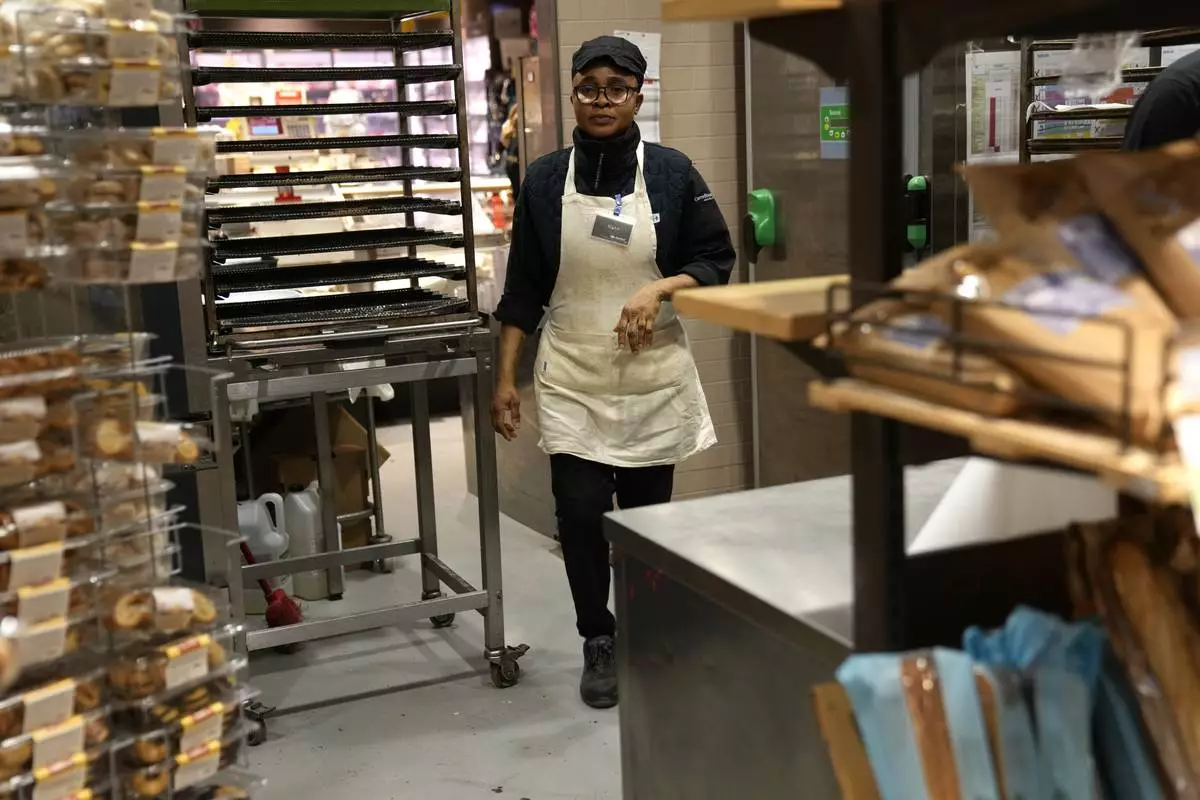
Ella Anthony smiles during an interview in the supermarket where she works, in Rome, Tuesday, March 26, 2024. Knowing that she faced a possible prison term since Nigeria criminalizes same-sex relationships, Anthony fled with her partner to Libya in 2014 and then Italy, where they both won asylum. Their claim? That they had a well-founded fear of anti-LGBTQ+ persecution back home. (AP Photo/Alessandra Tarantino)
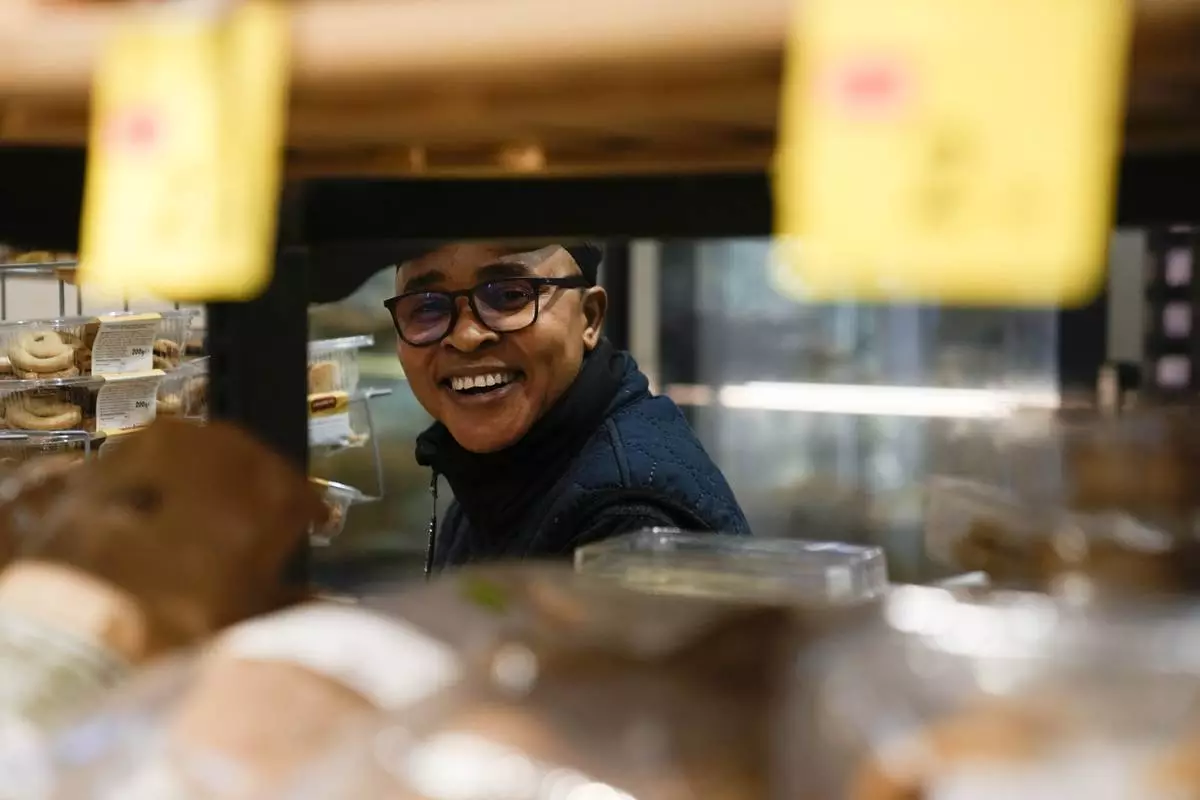
Ella Anthony smiles during an interview in the supermarket where she works, in Rome, Tuesday, March 26, 2024. Knowing that she faced a possible prison term since Nigeria criminalizes same-sex relationships, Anthony fled with her partner to Libya in 2014 and then Italy, where they both won asylum. Their claim? That they had a well-founded fear of anti-LGBTQ+ persecution back home. (AP Photo/Alessandra Tarantino)
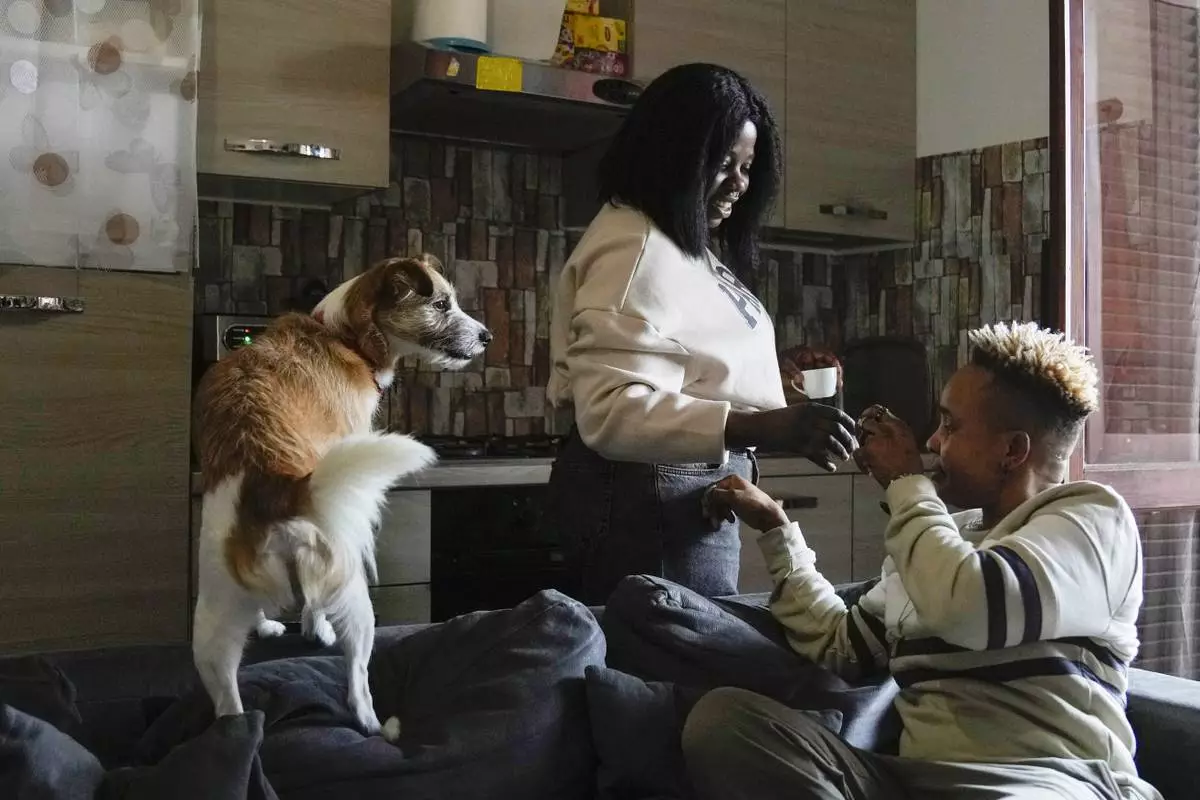
Ella Anthony, right , and her partner Doris Ezuruike Chinons, flanked by their dog Paddy, have a coffee during an interview in their house in Passo Corese, near Rome, Monday, March 11, 2024. Knowing that she faced a possible prison term since Nigeria criminalizes same-sex relationships, Anthony fled with her partner to Libya in 2014 and then Italy, where they both won asylum. Their claim? That they had a well-founded fear of anti-LGBTQ+ persecution back home. (AP Photo/Alessandra Tarantino)

Ella Anthony, right, and her partner Doris Ezuruike Chinons, dance in their house after an interview in their house in Passo Corese, near Rome, Monday, March 11, 2024. Knowing that she faced a possible prison term since Nigeria criminalizes same-sex relationships, Anthony fled with her partner to Libya in 2014 and then Italy, where they both won asylum. Their claim? That they had a well-founded fear of anti-LGBTQ+ persecution back home. (AP Photo/Alessandra Tarantino)
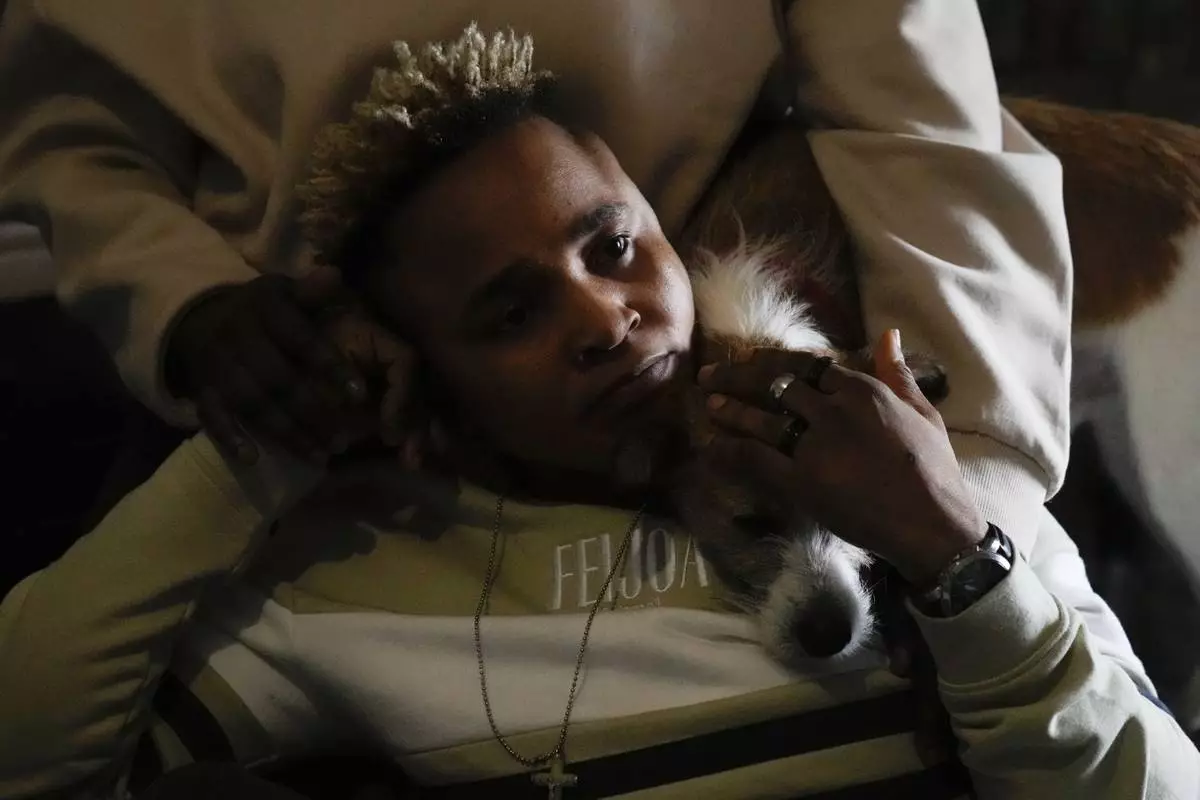
Ella Anthony, is hugged by her partner Doris Ezuruike Chinons during an interview in their house in Passo Corese, near Rome, Monday, March 11, 2024. Knowing that she faced a possible prison term since Nigeria criminalizes same-sex relationships, Anthony fled with her partner to Libya in 2014 and then Italy, where they both won asylum. Their claim? That they had a well-founded fear of anti-LGBTQ+ persecution back home. (AP Photo/Alessandra Tarantino)

Ella Anthony and her partner Doris Ezuruike Chinons show photos of themselves during an interview in their house in Passo Corese, near Rome, Monday, March 11, 2024. Knowing that she faced a possible prison term since Nigeria criminalizes same-sex relationships, Anthony fled with her partner to Libya in 2014 and then Italy, where they both won asylum. Their claim? That they had a well-founded fear of anti-LGBTQ+ persecution back home. (AP Photo/Alessandra Tarantino)
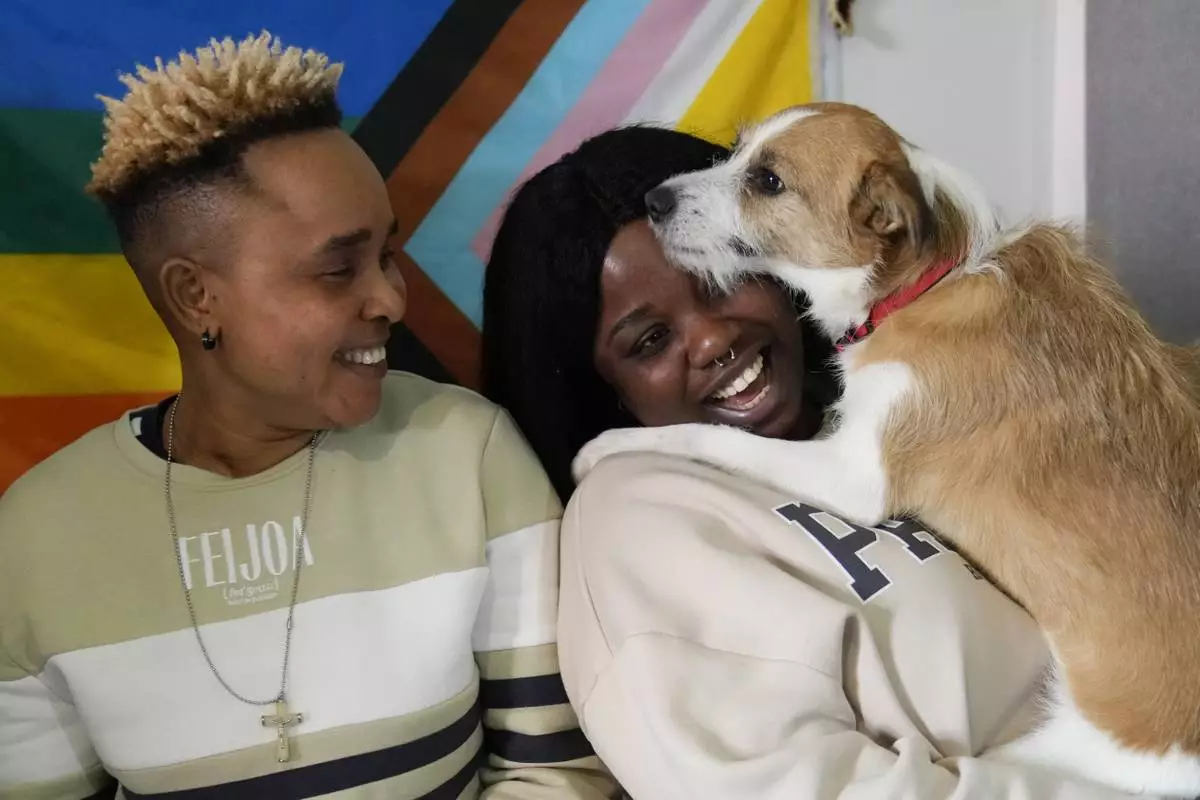
Ella Anthony, left, and her partner Doris Ezuruike Chinons pose for a photo with their dog Paddy, during an interview in their house in Passo Corese, near Rome, Monday, March 11, 2024. Knowing that she faced a possible prison term since Nigeria criminalizes same-sex relationships, Anthony fled with her partner to Libya in 2014 and then Italy, where they both won asylum. Their claim? That they had a well-founded fear of anti-LGBTQ+ persecution back home. (AP Photo/Alessandra Tarantino)




















